Last Update: September, 2025.
The Emirates Boeing 777-300ER seat map is one of the most searched by travelers because this aircraft is the backbone of Emirates’ fleet. With multiple layouts across Business Class, Economy, and Premium Economy, knowing the seat maps can help you pick the best seat before you fly.

Here’s What We’ll Cover
- Emirates Boeing 777-300ER Overview
- Emirates 777 Refurbished / Retrofitted Routes & Game Changer Routes
- Boeing 777-300ER Configurations Explained
- Exploring the Emirates 777-300ER Seat Map in 3D
- Emirates 777 Seat Maps by Cabin
- How to Check Your Aircraft’s Configuration
- 777-200LR vs 777-300ER
- Best Seats to Choose in Every Cabin
- True Window Seats vs Aisle Window Seats
- FAQs on Emirates 777 Seat Maps
- Summary
Emirates Boeing 777-300ER Overview
According to Emirates Group 2024-2025 Annual Report, Emirates operates a fleet of 130 Boeing 777 aircraft, divided into six different cabin configurations. This number includes both the Emirates Boeing 777-300ER (120) and the Boeing 777-200LR(10).
Understanding the different configurations available on the 777-300ER allows passengers to choose their seats wisely and maximize their comfort during flights.
Many travelers simply search for “Boeing 777 seating” when looking for Emirates layouts. It’s important to know that Emirates configures all of its 777-300ER aircraft in a 3-4-3 seating layout in Economy, and a 2-4-2 in Premium Economy but with variations in Business and First Class depending on the configuration.
Before we look at the seat maps on board the Emirates Airlines Boeing 777-300ER, let’s first explore the different configurations offered by the airline.
Emirates Boeing 777-300ER Configurations
Emirates currently operates three main layouts of the 777-300ER, plus the newest four-class retrofit:
Four-Class Layout (Newest Retrofit)
Launched in August 2024 as part of the retrofit project, this cabin is a nose-to-tail upgrade:
- Refurbished First Class
- Upgraded Business Class (new 1-2-1, replacing the old 2-3-2)
- Brand-new Premium Economy
- Refreshed Economy
👉 Emirates has chosen not to feature suites in their business class cabins like some competitors (e.g., Cathay Pacific’s new Aria Suites).
The business class cabin upgrade includes the removal of the dreaded 2-3-2 configuration and is replaced with 1-2-1. (About time! I remember getting seat poached in this cabin).
✈️ Game Changer Suites: Only 10 Emirates 777-300ER aircraft feature these innovative First Class private suites.
The Emirates game changer routes are few. If you are lucky enough to be on board, it is a rare treat in the skies. The Emirates game changer suites are only available on board the 777-300ER. They are not available on Emirates Airbus A380-800.
Emirates 777 Routes (2025 Update)
Where Do the Refurbished 777’s fly?
*Updated September 2025
Game Changer Routes:
The Retrofitted / Refurbished 777-300ER with the First Class Game Changer Suites flies on these routes:
| Destination | Flight Numbers |
|---|---|
| 🇨🇭 Geneva | EK 83 / EK 84, EK 89 / EK 90 |
| 🇧🇪 Brussels | EK 183 / EK 184, EK 181 / EK 182 |
| 🇯🇵 Tokyo Haneda | EK 312 / EK 313 |
| 🇰🇼 Kuwait | EK 855 / EK 856 |
| 🇸🇦 Riyadh | EK 815 / EK 816 |
| 🇸🇦 Dammam | EK 823 / 824 |
| 🇦🇺 Melbourne | EK 404 / EK 405 |
| 🇺🇸 Chicago | EK 235 / EK 236 |
Refurbished (but not Game Changer) Routes:
The 777’s that feature a refurbished first class, an upgraded business class cabin in a 1-2-1 arrangement, a brand-new premium economy class cabin and a refreshed economy class currently fly to the following cities:
(They do not feature the game changer first class suites unless of course there are last minute changes)
🌎 North America
| Destination | Flight Numbers | Status / Notes |
|---|---|---|
| Boston | EK 237 / EK 238 | Operating |
| Dallas | EK 221 / EK 222 | Operating |
| Seattle | EK 229 / EK 230 | Operating |
| Newark / Athens | EK 209 / EK 210 | Operating |
| Miami / Bogotá | EK 213 / EK 214 | Operating |
🇪🇺 Europe
| Destination | Flight Numbers | Status / Notes |
|---|---|---|
| Lisbon | EK 191 / EK 192, EK 193 / EK 194 | Operating |
| Dublin | EK 161 / EK 162 | Operating |
| London Stansted | EK 67 / EK 68 | Operating |
| Athens | EK 209 / EK 210 | Operating |
| Madrid | EK 143 / EK 144 | From 16 September 2025 |
| Frankfurt | EK 043 / EK 044 | From 15 December 2025 |
🌏 Asia & Middle East
| Destination | Flight Numbers | Status / Notes |
|---|---|---|
| Hong Kong | EK 382 / EK 383 | Operating |
| Maldives | EK 658 / 659, EK 656 / 657, EK 660 / 661 | Operating |
| Kolkata | EK 572 / EK 573 | Operating |
| Colombo | EK 650 / EK 651 | Operating |
| Seoul | EK 324 / EK 325 | Operating (Mon–Wed–Fri) |
| Kuala Lumpur | EK 346 / EK 347 | From 15 October 2025 |
| Phuket | EK 396 / EK 397 | From 1 December 2025 |
| Mumbai | EK 504 / EK 505 | From 26 October 2025 |
| Bahrain | EK 833 / EK 834 | From 4 December 2025 |
🌍 Africa
| Destination | Flight Numbers | Status / Notes |
|---|---|---|
| Johannesburg | EK 765 / EK 766, EK 761 / EK 762 | Operating (1–25 September 2025) |
| Cape Town | EK 770 / EK 771 | From 20 September 2025 |
The Four Types of Emirates Boeing 777’s
All the types of Boeing 777s listed on Emirates’ website are essentially variants of the Boeing 777-300ER (Extended Range). Emirates categorizes them differently based on class configurations and the range of routes they operate.
Emirates 777-300ER Configurations
| Variant Name | Cabin Layout | Typical Use Case |
|---|---|---|
| 777 Four Class Ultra Long Range (ULR) | First, Business, Premium Economy, Economy | Very long-haul routes |
| 777 Three Class Ultra Long Range (ULR) | First, Business, Economy | Long-haul routes |
| 777 Three Class Extended Range (ER) | First, Business, Economy | Long-haul, not always ULR |
| 777-300 Two Class Extended Range (ER) | Business, Economy | Regional or high-demand routes without First Class |
💡 Note: Despite the different labels on their website, they are all Boeing 777-300ERs with varying cabin layouts and range specifications. The reason you only see “777-300ER” when booking is because it refers to the aircraft type itself, while the other terms on the website refer to the internal configuration and intended use of the aircraft.
Explore the Emirates 777-300ER Seat Map in 3D
Emirates offers an official interactive 3D seat map of the Boeing 777-300ER, where you can explore the cabins in detail before you fly.
The 3D version showcases the three-class configuration of the 777-300ER:
- Economy Class – arranged in the standard 3-4-3 configuration.
- First Class – the exclusive Game Changer Suites with floor-to-ceiling privacy.
- Business Class – still in the older 2-3-2 layout.
Check out the Emirates 777-300ER 3D Seat Map here
Emirates Boeing 777-300ER Seat Maps
Emirates 777-300ER Seat Map – Two-Class Layout
The two-class Emirates Boeing 777-300ER seat map is the densest version of the aircraft, with no First Class cabin. It offers just Business and Economy seats, and is mainly used on high-demand routes where Emirates prioritizes capacity.
| Cabin | Seats | Layout | Notes |
|---|---|---|---|
| Business | 42 | 2-3-2 | Older design, limited privacy |
| Economy | 386 | 3-4-3 | Standard Emirates 777 layout |
Business Class Layout (2-3-2)
The Emirates 777-300ER Business Class seat map in this layout has 42 seats in a 2-3-2 configuration.
- Middle seats are the least desirable.
- Aisle seats are most practical for access.
- Window pairs work well for couples.
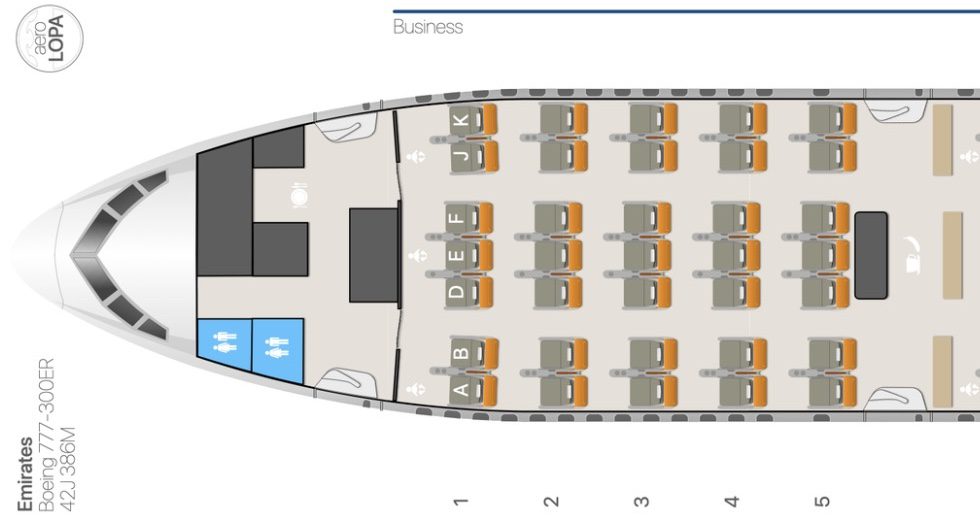
Economy Class Layout (3-4-3)
The Emirates 777-300ER Economy Class seat map here has 386 seats in a 3-4-3 layout.
- Exit rows: extra legroom.
- Bulkhead seats: bassinets for families.
- Avoid seats near lavatories/galleys.

Emirates 777-300ER Seat Map – Three-Class Layouts
The three-class Emirates Boeing 777-300ER seat maps are the most common. They combine First, Business, and Economy cabins.
✈️ Note on Emirates’ Three-Class 777s
Emirates actually operates three slightly different three-class versions of the Boeing 777-300ER. The differences come down to small changes in seat counts — a few more seats in Economy here, a few fewer in Business there. The cabin layout itself (First, Business, and Economy) remains almost identical across all three.
Rather than showing three near-duplicate seat maps, we’ve grouped them together here for clarity. The table below highlights the range of seat numbers you’ll find depending on which exact aircraft you’re flying.
| Cabin | Seats (Range) | Layout | Notes |
|---|---|---|---|
| First | 8 | 1-2-1 suites | Classic Emirates First Class |
| Business | 42–72 | 2-3-2 | Older layout, less privacy |
| Economy | 304–310 | 3-4-3 | Standard Emirates Economy |
First Class Layout (1-2-1)
The First Class seat map in this layout has 8 suites arranged 1-2-1. While not Game Changer suites, they still offer privacy and luxury.
Business Class Layout (2-3-2)
The Business Class seat map shows either 42 or 72 seats, all in the 2-3-2 configuration.
- Avoid middle seats.
- Best options: aisle/window combos.
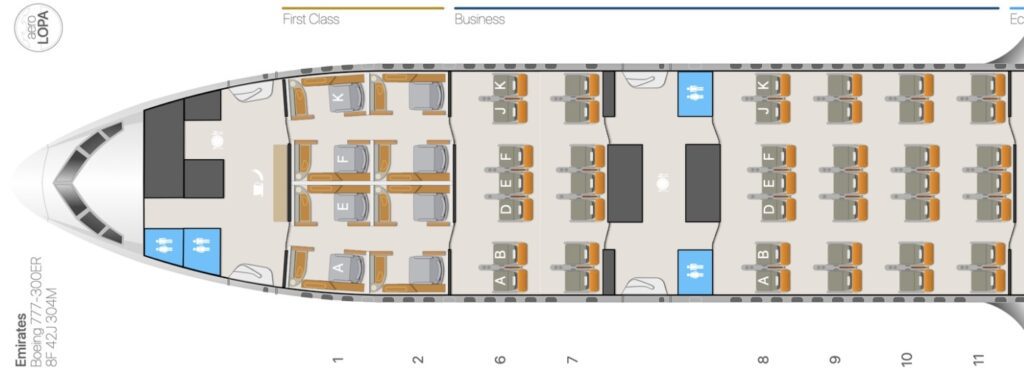
Economy Class Layout (3-4-3)
The Economy seat map shows 304–310 seats in a 3-4-3 design.
- Exit rows: extra legroom.
- Front rows: faster disembarkation.

Emirates 777-300ER Seat Map – Four-Class Layout (Game Changer + Premium Economy)
The four-class Emirates 777-300ER seat map is the newest retrofit, introduced in 2024. It includes the exclusive First Class Game Changer suites, plus Business, Premium Economy, and Economy cabins.
| Cabin | Seats | Layout | Notes |
|---|---|---|---|
| First | 6 | 1-1-1 suites | Game Changer Suites |
| Business | 38 | 1-2-1 | New layout, more privacy |
| Premium Economy | 24 | 2-4-2 | Spacious, more legroom |
| Economy | 256 | 3-4-3 | Standard Emirates layout |
First Class Game Changer Suites (1-1-1)
The Game Changer seat map features 6 First Class suites in a unique 1-1-1 layout. These are fully enclosed with floor-to-ceiling privacy and even virtual windows for middle seats.
Business Class Layout (1-2-1)
This retrofit introduces a modern 1-2-1 Business Class cabin, finally replacing the outdated 2-3-2 layout.
- True window seats: even-numbered rows (6, 8, 10). (You can read further down and see exactly what a true window seat is vs an aisle window seat)
- Couples: middle pairs in even rows.
- Solo: middle singles in odd rows.
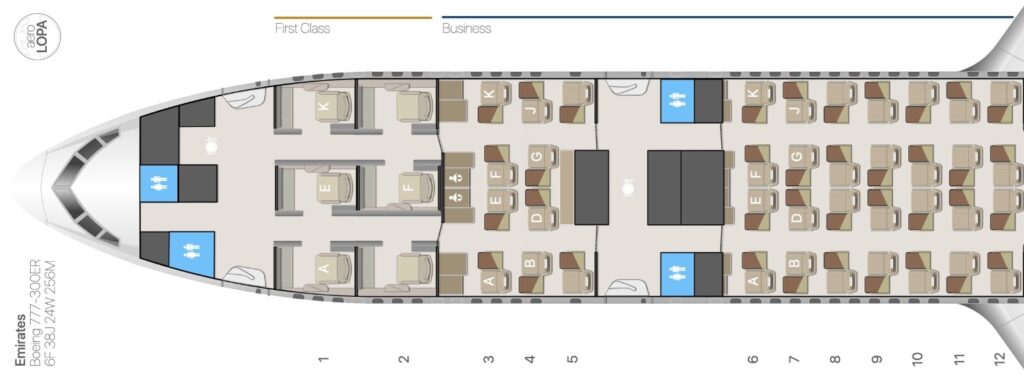
Premium Economy Layout (2-4-2)
The Emirates 777 Premium Economy seat map shows 24 seats in a 2-4-2 layout, located between Business and Economy.
- Best seats: Row 14 bulkhead (extra legroom).
- Front rows: faster disembarkation.
Economy Class Layout (3-4-3)
The Economy Class cabin has 256 seats in the 3-4-3 layout.
- Exit rows: most legroom.
- Row 38: bassinets for families.

(*seatmaps credit: Aerolopa)
📌 It’s important to note that Emirates is still undergoing major upgrades on their 777 fleet. These include a change to the current business class configuration of 1-2-1 rather than the current 2-3-2.
✅ According to their annual report, as of March 2025, 20 Boeing 777’s have been retrofitted. They intend to retrofit 56 in total.
How to Check Which Emirates 777 You’re Flying
When making your booking through Emirates you will be able to see exactly the configuration your aircraft has, when you come to the seat selection. If you are after the new 777-300 with the 1-2-1 business configuration then you can clearly see this on the seatmap.
Another good place to check your aircrafts exact seat configuration is ExpertFlyer. Simply enter your destination, dates and select to see your seat map.
Here’s how that works:
Through the Emirates Site:
Go to the Emirates official site
1. Search Flights: Enter Departure & Arrival Airports. Select Dates & Class.
2. Select the flight you want (note the Aircraft Type next to the flight number)
3. Click on the “non Stop” text to view the accurate model
4. Select Flight & continue to passengers
5. Enter your details – Save & Next
6. Continue to Options
7. Choose Seats
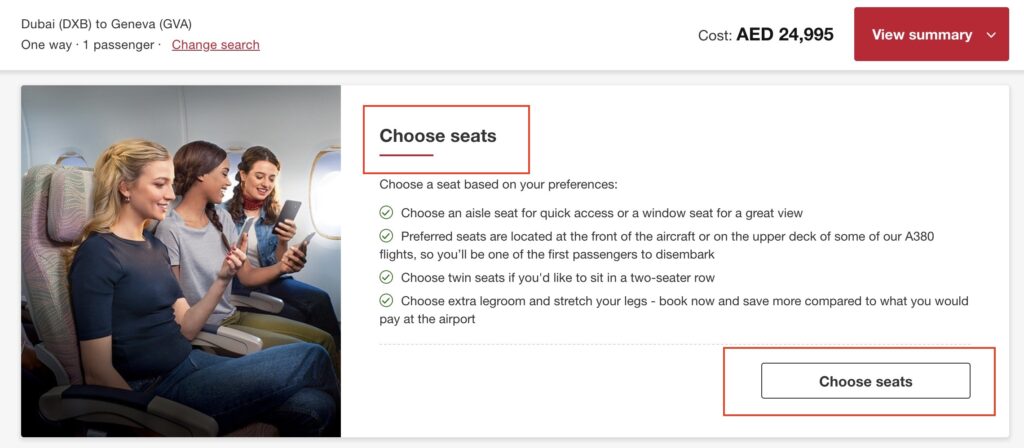
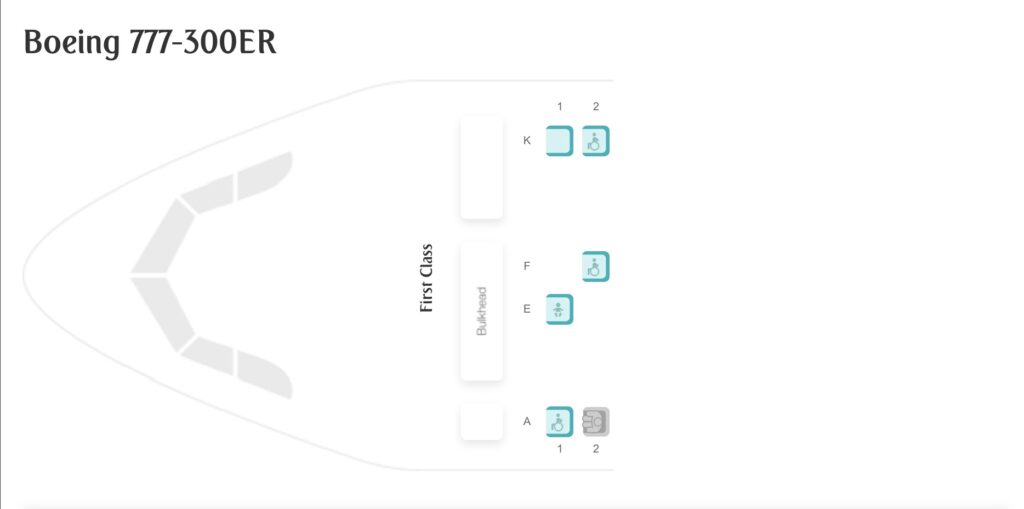
Here you are able to see the exact seat map and configuration of your actual flight. It doesn’t get more accurate than this unless there is a last minute aircraft switch.
Through the ExpertFlyer Site:
Go to the ExpertFlyer site
1. Flight availability
2. Enter your dates, flights and select Emirates
3. Find the flight you are interested in
4. Click on the little seat on the right hand side to open up the seat map
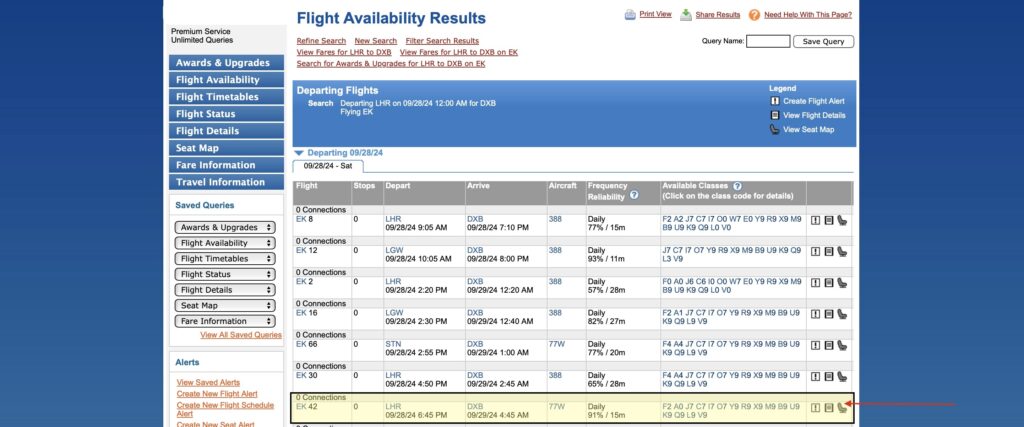

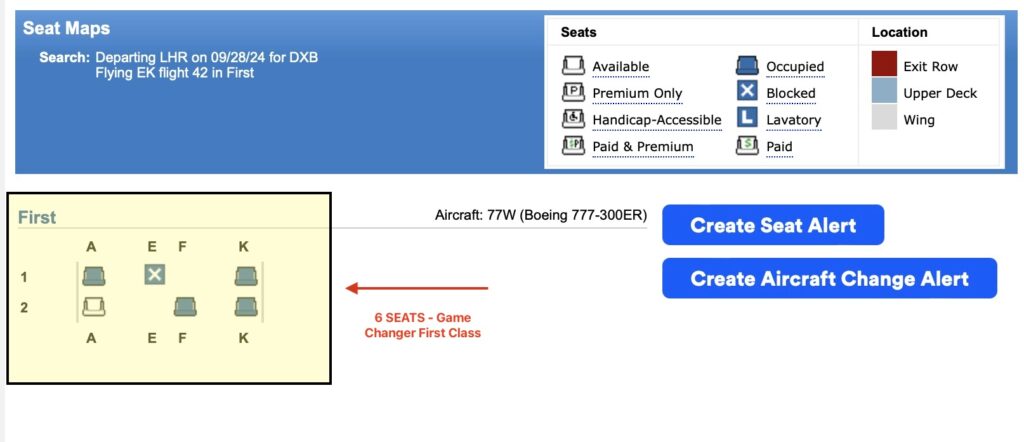
Emirates Boeing 777-200LR vs 777-300ER
The Boeing 777-200LR and Boeing 777-300ER belong to the same aircraft family but are built for different missions:
✈️➡️ 777-300ER (Extended Range): Configured to carry more passengers efficiently on long-haul routes, making it the workhorse of Emirates’ fleet.
🌍✈️ 777-200LR (Longer Range): Designed for ultra-long haul flights with fewer passengers but the ability to fly some of the world’s longest routes.
Booking & Labelling
When booking with Emirates, the aircraft type should be listed correctly in your flight details. In reality, some third-party booking systems may simply show “Boeing 777,” which can cause confusion.
- On routes usually served by the 777-200LR (for example, Dubai to Barcelona, or the Emirates fifth-freedom route Barcelona to Mexico City), you should see “Boeing 777-200LR” in the booking details.
- The 777-300ER will appear on most other Emirates long-haul flights, reflecting its larger capacity.
Emirates Fleet Information
Emirates itself does clearly differentiate between the two models in its official seat maps and fleet details. If you want to be sure which aircraft you’re flying, checking directly with Emirates is always the most reliable option.
Emirates’ official seat maps and detailed fleet information do differentiate between these models.

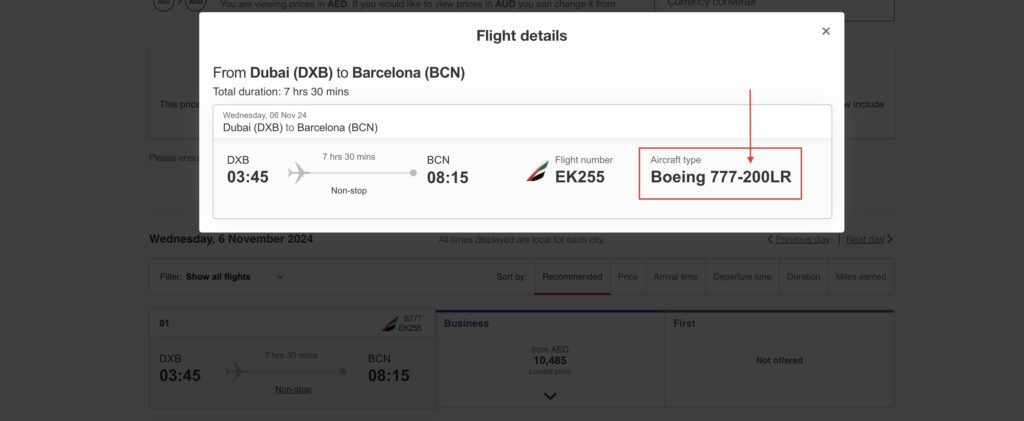
Another way to differentiate between them and know which aircraft you are flying is through the use of flight apps such as flightaware. You can typically enter your flight number or destination and it will populate a list of recent flights and the aircraft that is used. Alternatively you could search by Tail Numbers:
Some known tail numbers for Emirates’ Boeing 777 fleet include:
- Emirates Boeing 777-200LR (ULR):
- A6-EWA, A6-EWB, A6-EWC, A6-EWD, A6-EWE, A6-EWF, A6-EWG
- Emirates Boeing 777-300ER:
- A6-EQA, A6-EQB, A6-EQC, A6-EQD (all the way through A6-EPZ and newer registrations like A6-EQR and beyond)
These tail numbers help identify specific aircraft, including the model and configuration used by Emirates for different routes.
Here’s what that looks like:
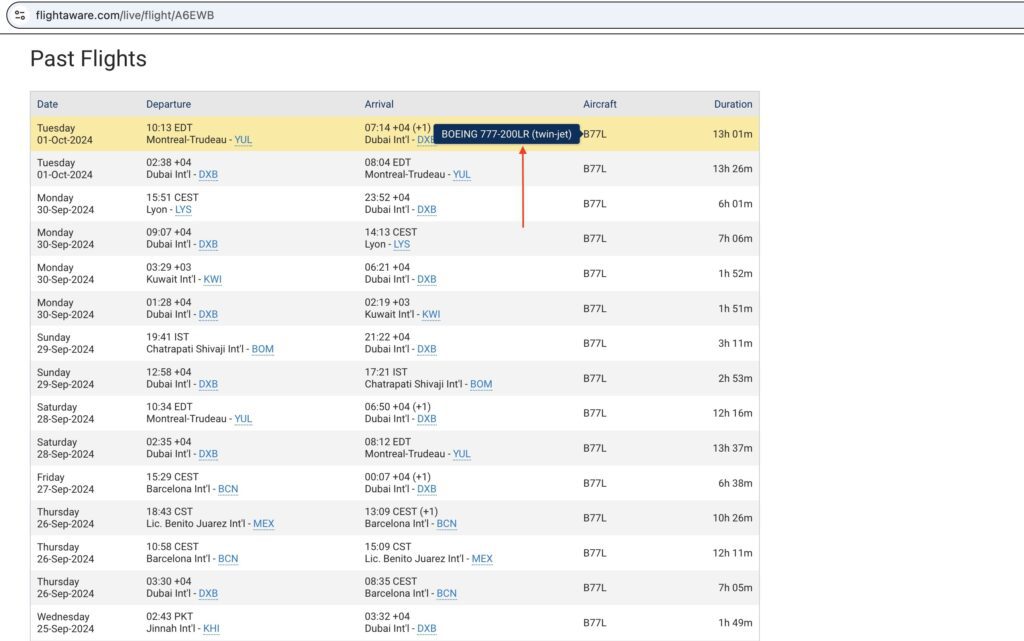
Selecting the Best Seats on Emirates 777-300ER
First Class Layout & Game Changer Suites
When selecting the best seats on board the Emirates Boeing 777-300ER, consider your priorities for comfort and convenience. The Emirates Boeing 777-300ER First Class seat map includes either 6 or 8 suites, depending on configuration.
A small note: Premium cabins are evolving not just in layout, but also in access rules. As of May 2025, Emirates no longer permits blue tier skyward members to access first class when redeeming award tickets. In further developments as of mid August 2025 it has ban totally children under the age of 9 from accessing redemption tickets in first class.
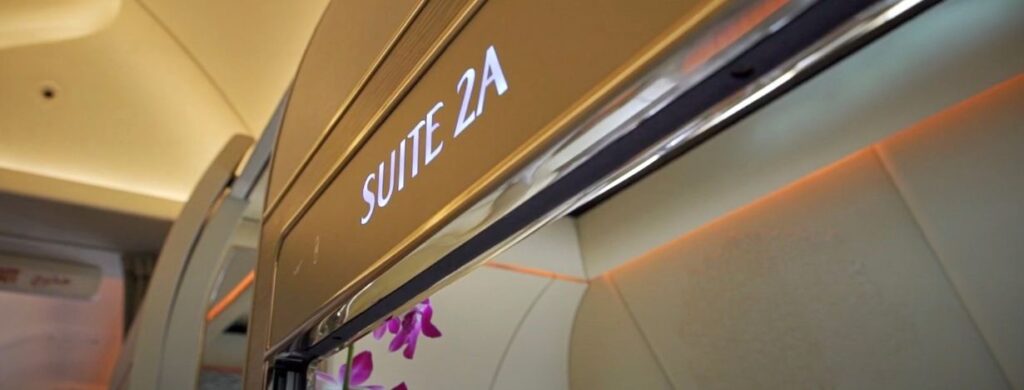
Seat 1A is highly sought after by aviation enthusiasts. It has a symbolic value, as it represents the pinnacle of air travel at the very front of the plane. Seat 1A can feel like a special achievement for aviation lovers. Seat 1A is often considered the number one seat on an aircraft, both figuratively and literally.
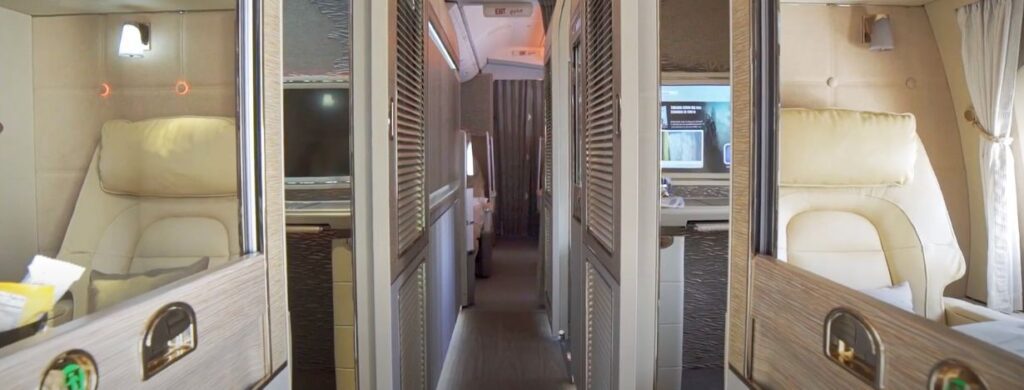
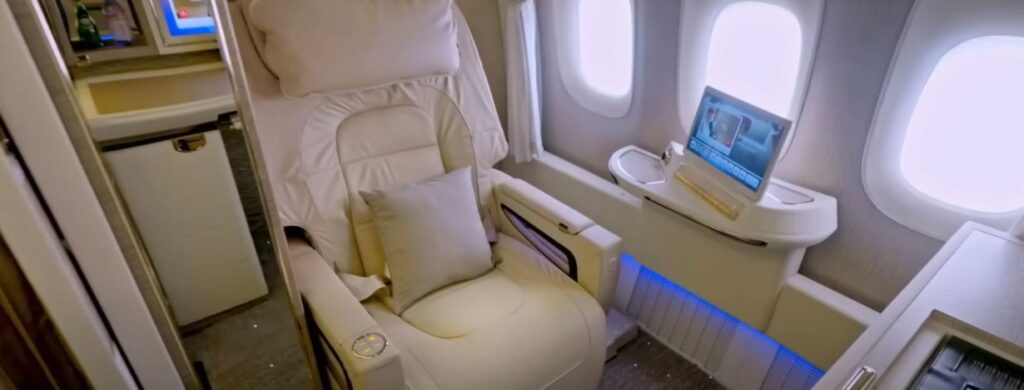
Although to be honest I can’t see a bad seat in First Class, especially with the game changer having virtual windows in the middle aisle seats. Additionally, there are only 6 seats in the cabin. I’d take any of these! It may not do anything for jet lag but you certainly come out the other end less exhausted!
Onboard Emirates First Class, there are no overhead baggage compartments, making it ideal for those who prefer to pack light. Instead, you can conveniently store your cabin trolley in the dedicated space within your suite. Just ensure you know the carry on baggage allowance with Emirates. This allows you to keep your luggage with you throughout the journey, ensuring easy and quick access whenever needed, without the hassle of overhead storage.
Business Class Layout & Best Seats
The Emirates Boeing 777-300ER Business Class seat map varies depending on whether the aircraft is retrofitted.
In Business Class, seats located in the middle section of the aircraft (between the wings) are generally preferred due to their stability during flight, offering a smoother experience. Additionally, aisle seats provide easy access without having to disturb fellow passengers.
If i am on the four class configuration, I generally look out for any seat from Row 3 & 4 or 9 to 11 just so I can get served faster (especially on a night flight). Disembarking quick is also a factor, whilst staying within a quieter area (away from the galleys, restrooms and onboard bar) is also a priority for me. I generally like to catch up on emails on long haul flights.
💡 Pro tip: When flying long-haul, I usually end up checking emails or messaging family over airport or Emirates Wi-Fi. To keep things simple and private, I use a VPN like Express VPN or NordVPN so I don’t have to worry about open networks while traveling.
If you are travelling in pairs go for the even row numbers as these seats are next to eachother. The odd number rows have the compartment in the middle designed for solo travellers.
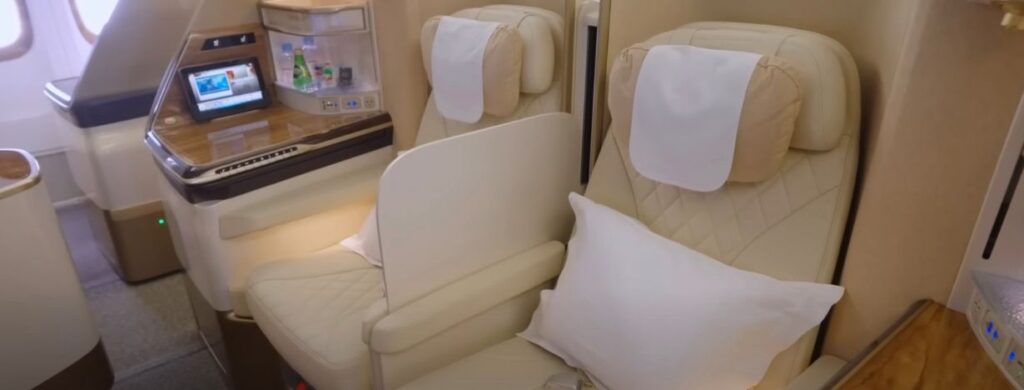
Likewise look out for the window seats. There are true window seats and aisle window seats.
The true window seat is positioned right next to the window, giving you an unobstructed outside view. The personal storage compartment and drink bar are located on the opposite side, to your right, creating a more private and tucked-in feel.
In contrast, the aisle-side window seat is set closer to the aisle, with the compartment and drink bar placed between you and the window. While it’s still technically a window seat, the extra distance from the window and its open aisle position make it feel slightly less private than the true window option.
Opt for the even row numbers like 6,8,10 that have the true window seat.


If you are flying the old configuration and the dreaded 2-3-2 business class layout, you would want to steer clear of the middle seats. You literally have to hover over people to get out if placed in the middle. If they are in a lay flat position this becomes even more challenging. I would opt for an aisle seat on the window section of the cabin.
Premium Economy Layout & Best Seats
The Emirates Boeing 777-300ER Premium Economy seat map is only available on refurbished four-class aircraft.
In Premium Economy on the Emirates Boeing 777-300ER, the best seats are typically those located in the first row (Row 14) of the cabin, also known as bulkhead seats, as they provide extra legroom and a more spacious feel. These seats are ideal for travellers who prioritize comfort and space.
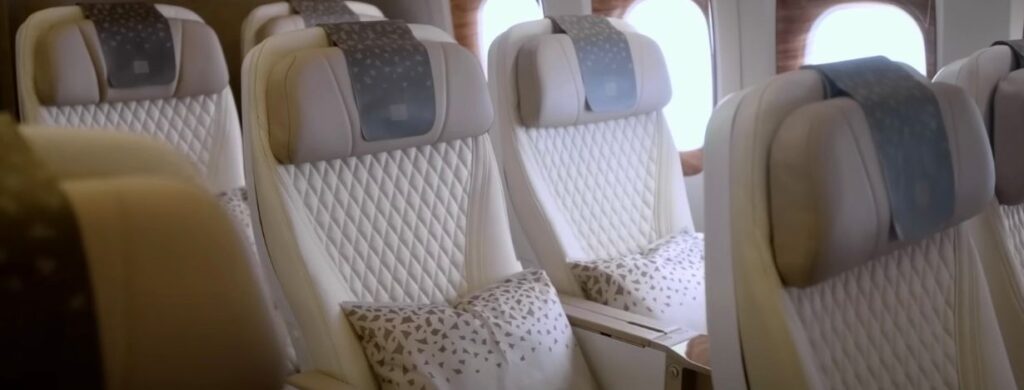
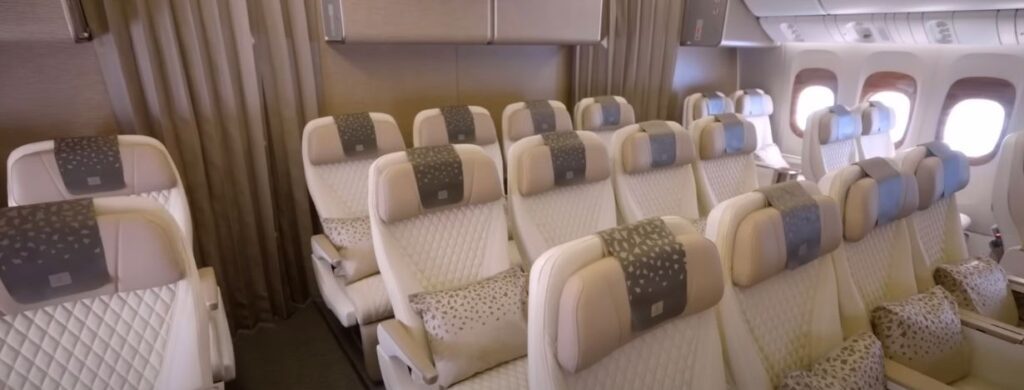
Seats located toward the front of the Premium Economy cabin also allow for quicker boarding and disembarkation, which can be convenient for those with tight connections or who simply want to exit the plane faster. As with other classes, choosing a seat away from the lavatories and galleys can ensure a quieter and more peaceful experience. Additionally, window seats offer a more private and scenic flight, making them popular among solo travellers looking for a bit of extra comfort.
Economy Class Layout & Best Seats
The Emirates Boeing 777-300ER Economy seat map always follows a 3-4-3 configuration, though seat pitch and cabin size vary by aircraft.
In Economy class, seats near the front of the cabin are desirable for faster disembarkation, while bulkhead and exit row seats provide extra legroom, making them a top choice for taller travellers. Row 24 are the exit rows on the 4 class configuration as are Rows 37. Baby bassinet seats are available on Row 38 if you are travelling with infants or kids.
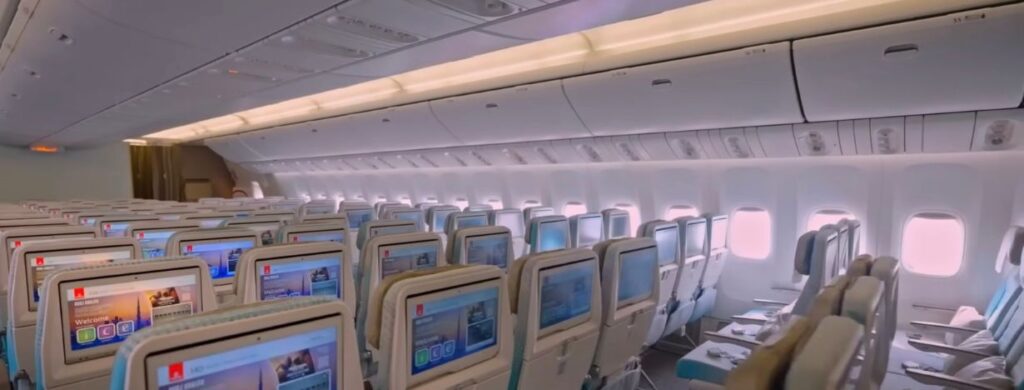
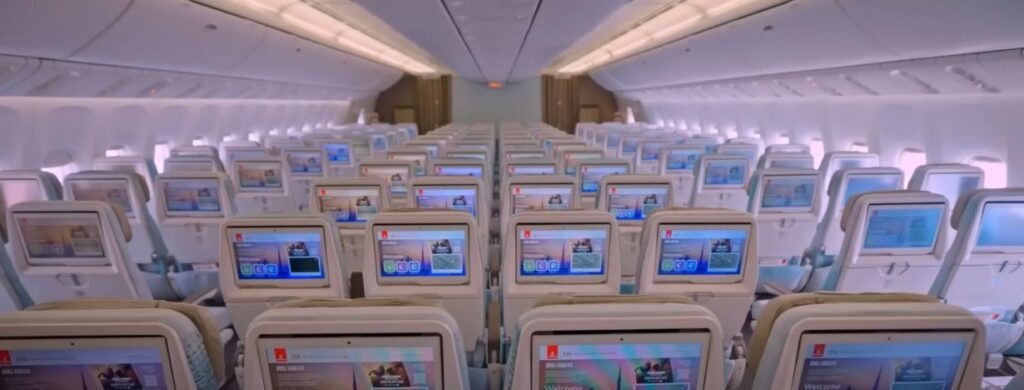
However, these seats may be located near lavatories, which can lead to more foot traffic. Lastly, for those seeking quieter zones, avoiding seats near galleys and lavatories is a good idea, as these areas tend to experience more noise and movement during the flight.
The back end of the aircraft narrows off at Row 46 and has a configuration of 2-4-2. This may be appealing for couples who want to be seated next to each other in a private setting.
FAQs on Emirates 777 Seat Maps
Does Emirates have a 3D seat map for the 777-300ER?
Yes, Emirates does provide a 3D map. You can view it on their official site by navigating to their Emirates Fleet in 3D.
Which Emirates 777s have Premium Economy?
The refurbished four-class 777-300ERs.
Does Emirates 777 have a 3-4-3 economy layout?
Yes, all Emirates 777-300ERs use 3-4-3.
What are the best seats in Emirates 777 Business Class?
True window seats in even rows (6, 8, 10).
How do I know if my Emirates 777 has Game Changer Suites?
Only 10 aircraft — check via seat selection or ExpertFlyer.
What’s the difference between Emirates 777-200LR and 777-300ER?
The 200LR is for ultra-long flights; the 300ER is larger and more common.
Which Emirates 777 routes are most likely to have the Game Changer Suites?
Routes to Geneva, Tokyo Haneda, Brussels, Chicago, Melbourne, Riyadh, and Kuwait are among those scheduled with Game Changer aircraft.
Summing Up
Now that you have all the information in front of you, from understanding the various configurations of the Emirates Boeing 777-300ER to navigating seat maps, you are well-equipped to select the perfect spot for your journey. Emirates offers a diverse range of seating options across its four classes, each designed with different travel needs in mind. It is one of the reasons I actively fly with them.
The best part is that i do it for free both on business and first class. I accumulate points through the Amex Membership program and from there its a very simple process to transfer my amex points to Emirates. But I also ensure that i use as less miles as possible. Redemption value on miles/points is important so that you get bang for buck. You can use a point redemption value calculator to do this. It’s also important to be on top of changes. In December 2025 Amex Membership Rewards is shaking things up and it’s not in our favour. A massive devaluation on airline points with emirates being the worst of all.
Having said that, I still love flying with Emirates. Their customer care is exceptional, and nothing is ever too much trouble for them. Their ground service is equally fabulous. Their lounges are all exquisite. I recently visited their new bangkok lounge and was blown away. On several occasions, they’ve gone above and beyond, like transferring my luggage straight through even when I was on separate tickets, saving me rechecking them on my connecting flights.
Plus, I have always had a free stopover in Dubai, fully paid by Emirates, which is an amazing perk that adds great value to my trips. These little details are what keep me choosing Emirates again and again.
Ultimately knowing your aircraft and choosing the right seat can enhance your entire flight experience, ensuring you arrive refreshed and satisfied. If you need a hand packing feel free to download this ultimate travel packing list which includes items you may not have thought of.
🌍 Don’t forget that when you travel abroad, it’s also important to stay safe when connecting through public wifi’s. I always use a VPN whilst overseas. With NordVPN, you can browse securely on public Wi-Fi and keep access to your favourite sites wherever you fly.
Happy travels!
Affiliate Disclosure: This website contains affiliate links, which means we may earn a commission if you click through and make a purchase — at no additional cost to you. We only recommend products and services that we genuinely believe add value to our readers.

